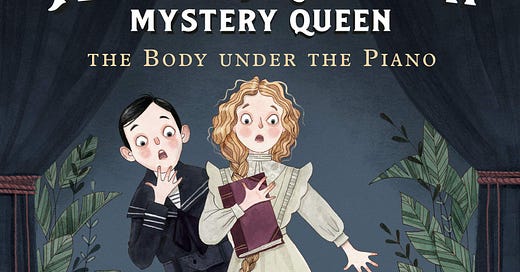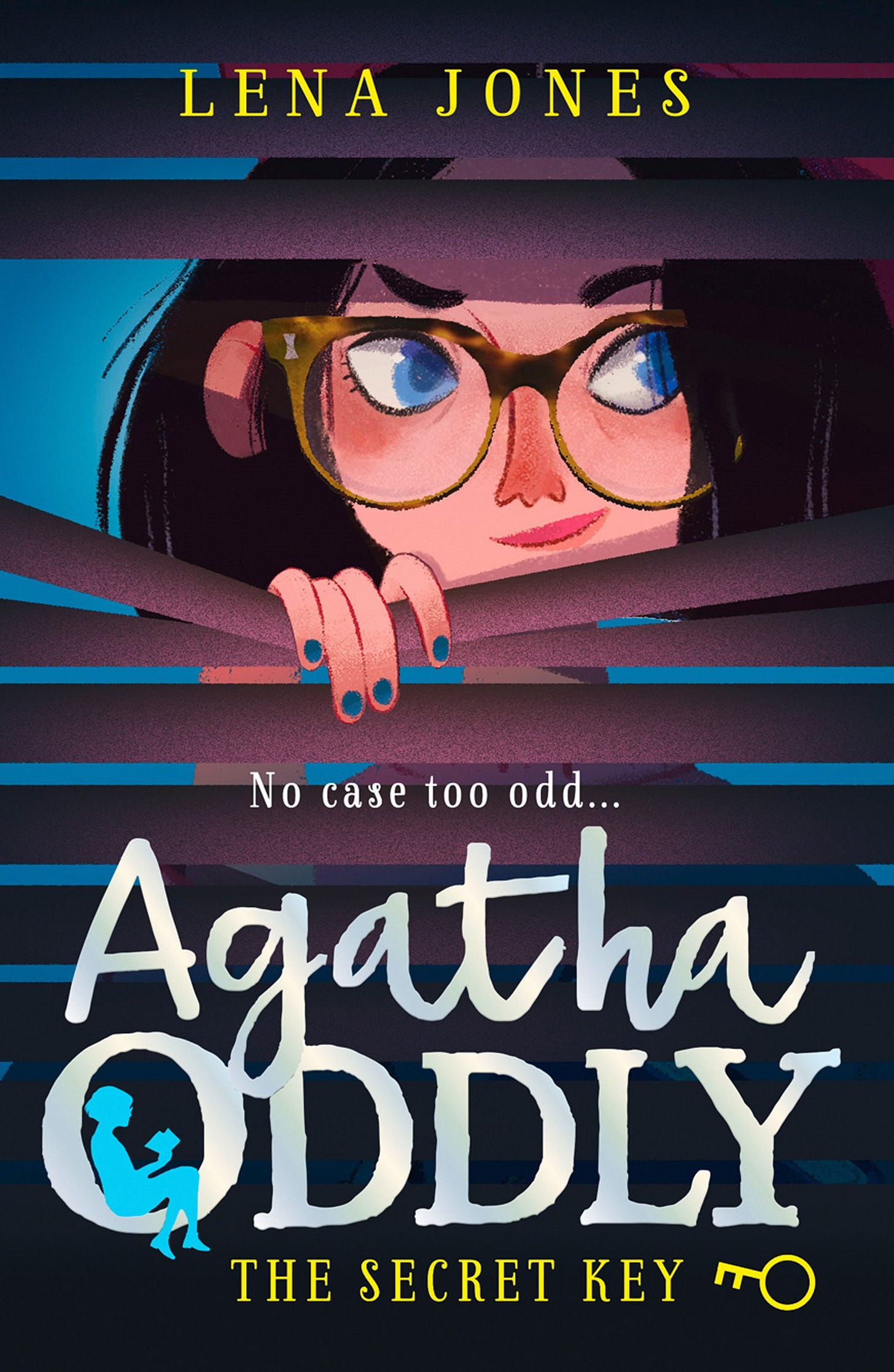Two girl sleuths named Agatha and an endlessly shirtless punching detective
Middle grade mysteries, yet another giallo, and Jack Reacher
Hi, friends,
Some mini-wins from the past week:
We were complete adults and did our taxes yesterday, like two whole weeks before they were due!! Good job, us.
Our local raven has gone bananas with spring fever, the phoebes and cowbirds showed up yesterday, and everything is starting to get greener.
The lemon extract I made a few months ago—I jammed a whole bunch of lemon peel into a bottle of vodka and stuck it in the cupboard—is ready, and I baked with it with DELICIOUS results.
“It seems to me,” said Grannie Jane afterward, “that Mr. Roddy Fusswell is similar in temperament to little Bertie Cummings who lived down the road when I was a girl. Bertie waited for the braver boys to climb the vicarage wall and sneak out with their pockets full of plums. When he managed to cadge one, he’d make a great show of munching it in front of the rest of us, as proof of great naughtiness on his part.”
—The Body Under the Piano, by Marthe Jocelyn
Aggie Morton, Mystery Queen: The Body Under the Piano, by Marthe Jocelyn
Torquay, 1902. Aggie Morton—who is not meant to be the ACTUAL Dame Agatha, but is very much an imagining of a childhood version of her—and her new friend Hector Perot, a logical and fastidious Belgian refugee, stumble upon a dead body and smack-dab into a murder mystery.
It isn’t long before our intrepid sleuths realize that A) the police are on entirely the wrong track, and B) if they want the real killer brought to justice, they’ll have to take care of it themselves, because the vast majority of adults in Torquay aren’t interested in listening to twelve-year-olds, especially if they are girls and/or foreign.
Over the course of the mystery—in addition to, you know, MURDER, Aggie and Hector contend with and learn about:
reality vs. how reality can be twisted by unscrupulous journalists
the parallels, similarities, and differences in how they—both of whom are regarded as lesser humans by most of the adults they interact with—are treated, touching on age, gender, and nationality
the hypocrisy of self-proclaimed charitable people, in that they are very quick to hold events to donate to refugees relocating to the area, but many of them are also very quick to be horrible to said refugees when they’re actually in the same space
It’s got lots of Christie Content beyond the Perot/Poirot connection: Aggie’s Grannie Jane is a clear Marple type; there’s ultimately a good deal of empathy for the murderer, which is not uncommon in Christie novels, and there are other nuggets for fans, like Aggie’s musing here:
The villains trounced by Sherlock Holmes were not given much to say for themselves. No book I’d ever read was narrated by a murderer. But killers, I imagined, carried more than their share of sorrow. Why else would they be so reckless with the hearts of others?
The action scenes are quite effective, and while I IDed the murderer quite early on, I have A) read a lot of murder mysteries, and B) am slightly out of the target demographic on this one—Jocelyn absolutely didn’t overplay her hand.
Aggie’s inner voice is quite funny:
“Saying good afternoon does not require sitting on a bench!” said Charlotte. “What would your mother say?”
“What would my mother say if she knew where you spent your hour?” I asked her calmly.
Charlotte stopped walking right in the middle of the pavement. “Miss Aggie, that’s blackmail.”
So easy to slip into a life of crime, I thought.
And so all of that, combined with being a middle grade historical murder mystery—pretty much my sweet spot—should have added up to the perfect match for me. Alas, though, it never completely grabbed me—while I appreciated a lot of what Jocelyn did here, I somehow never connected to it on an emotional level? Which, considering that Aggie is grieving her father’s recent death, is surprising.
It seems like one that would be just the thing for so many readers, though, so if you ARE a big fan—and if you’ve read any of the others in the series—do let me know, because I’d be willing to try the second one if you think it might be a better fit.
Agatha Oddly: The Secret Key, by Lena Jones
Agatha is thirteen, lives in London with her father—her mother died suddenly not too long ago—and is newish scholarship student at a fancypants private school. She was named for Agatha Christie, has a photographic memory, and is bound and determined to be a detective, no matter how many times she gets told off by adults for snooping.
Usually she’s looking for lost dogs and keeping tabs on Suspicious Teacher Activity, but after witnessing a hit-and-run in the park, she finds herself neck-deep in a life-threatening mystery connected to the city’s entire water supply… not to mention some new questions about her mother’s death.
Guys, I’ll keep this short: I’d been wanting to read this one for ages, and it was somewhat of a letdown. Agatha comes off as more middle-aged than thirteen in almost every way, and the whole thing reads more like a pitch for a television show than anything else. Honestly, it could easily be adapted into something I’d watch, because in the right hands, it could make for a really fun, stylish—Agatha wears a lot of wigs and disguises, has regular conversations with an imaginary Hercule Poirot, and does the BBC Sherlock thing where she looks around and catalogs clues via mental word cloud—show. In book form, though, it’s pretty flat.
‘The Gatekeepers are custodians of this country,’ she says, ‘and have been for centuries. We’re secret agents. We get the cases that MI5 can’t solve. When everyone else is stuck, we step in.’
—Agatha Oddly: The Secret Key, by Lena Jones
Watching:
Five Dolls for an August Moon (Mario Bava, 1970): This was a re-watch, because I was in the mood for more Agatha Christie-type stories, and this one VERY loosely parallels And Then There Were None. (And by ‘very loosely,’ I mean that it involves a bunch of people stranded on an island who start getting picked off one by one. Pretty much everything else is different.)
It’s not my fave giallo (or even my favorite Bava that uses this premise!), but it’s fun to watch for the clothes and the sets—there’s a revolving bed, even—and the jazzy music and the absurdly convoluted plot.
Reacher: Season One: I had all these grand plans to watch a couple of other Agatha Christie-related movies over the weekend, but then we watched the first episode of this somewhat ridiculous show, and suddenly it was two days later and we’d watched the whole rest of the season. I’m not sure if it’s SUPPOSED to be as hilarious as we found it? We giggled all the way through, in large part because we kept predicting the dialogue—and flashbacks—with 100% accuracy.
So on one hand, we’ve seen and heard every single line of dialogue, scene, and situation in this entire show, like, 9,000 times in other places… but on the other, sometimes it’s intensely comforting to watch something new but still predictable. It’s all really competently done—the action sequences are especially fun and genuinely tense, even though you’re never all that worried about our lead—and because it’s comprised entirely of very familiar tropes and archetypical characters, it ends up feeling like the platonic ideal of a somewhat warmhearted outsider detective thriller.
From pretty much the first few minutes, you know that no matter what, Reacher will ultimately beat up all the bad guys—and that he will make some sort of dad joke quip before getting to the punching. You know that eventually he will solve all the murders and save the neglected dog, that he will tie the excess amounts of animal feed that the Bad Corporate Man is buying for no clear reason to a conspiracy that could have repercussions on the ENTIRE! WORLD! ECONOMY! You know that he will walk out of an explosion largely unscathed while hundred dollar bills rain from the sky, and that he will finally get the piece of peach pie he keeps trying to have before walking off down the road to solve all the problems in some other town.
Also, let’s be real, it doesn’t hurt that Our Hero had to disrobe to change into non-bloodied clothes on an almost episode-by-episode basis.
And I’m always happen to see Bruce McGill, especially when he’s in full scenery-chewing mode.
Talk to you Thursday,
Leila







Yep, I TRIED with TWO Aggie Morton books. I just couldn't get into them, which was disappointing. And, I hear you on the "sounds like a TV pitch," novel; if I read another one of those I'll be very annoyed... we're encouraged to write "high concept" middle grade novels because The Big Hope (at least from editors?) is that they'll get picked up in this target-rich people-watching-more-small-screen-adaptions world, but sometimes the heart of those types of books gets left right out.